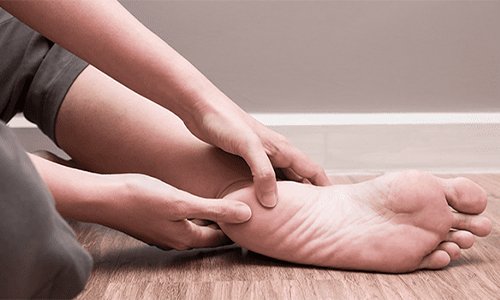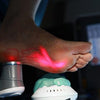A Marathon Runner's Guide for Heel Pain

Running a marathon is a great achievement that demands effort, discipline, and mental fortitude. However, many hours of training and pounding the pavement can take a toll on a marathon runner's body, with heel discomfort being a regular complaint. Heel pain can be devastating, but with proper knowledge, you can prevent, manage, and overcome it. In this post, we'll look at the numerous reasons for heel discomfort in marathoners and offer advice on how to treat it.
Understanding Heel Pain
Heel pain is a common complaint among athletes, particularly marathon runners. It can appear in a variety of ways, with plantar fasciitis being one of the most frequent. Plantar fasciitis is caused by inflammation of the plantar fascia, which is a thick band of tissue that runs along the bottom of your foot, connecting your heel bone to your toes. This tissue, when irritated or stretched, can result in pain, particularly in the heel area.
Heel Pain in Marathon Runners: What Causes It?
1. Overuse and Overtraining: Marathon training often involves high mileage and intensive exercises, which can lead to overuse injuries. Repetitive stress on the feet and heels can develop in microscopic tears in the plantar fascia, causing inflammation and pain.
2. Inadequate Footwear: Wearing the wrong running shoes or shoes that have lost their cushioning and support might contribute to heel pain. It is imperative to purchase high-quality running shoes that are appropriate for your foot type and running style.
3. Improper Running Form: Running with poor biomechanics, such as excessive pronation (rolling inward) or supination (rolling outward), can put strain on the plantar fascia and cause heel pain.
4. Sudden Increases in Training Volume: Without proper rest and recuperation, a quick increase in mileage or intensity can stress the plantar fascia and cause pain.
5. Tight Muscles and Tendons: Tight calf muscles and Achilles tendons can pull on the heel bone and contribute to heel discomfort.
6. Biomechanical Issues: Some runners may be predisposed to heel pain due to structural abnormalities such as flat feet or high arches. In such circumstances, custom orthotics or specialized shoe inserts may be required.
Managing Heel Pain
1. Rest and Recovery: If you have heel pain, you must rest and allow your body to recover. Running despite pain might aggravate the situation and lead to chronic complications.
2. Stretching and Strengthening: Stretching your calf muscles and Achilles tendons on a regular basis will assist relieve tension on the plantar fascia. Exercises that strengthen the foot and ankle muscles might also be beneficial.
3. Proper Footwear: Invest in a pair of well-fitting running shoes with adequate arch support and cushioning. Consider obtaining a gait analysis to find the best shoes for your running style.
4. Orthotics and Insoles: Orthotic inserts, whether custom or over-the-counter, can assist rectify biomechanical abnormalities and provide additional support to the arches.
5. Ice and Massage: Applying ice to the affected area and using a foam roller or massage ball to loosen tight muscles can reduce inflammation and ease heel pain.
6. Anti-Inflammatory medications: Nonsteroidal anti-inflammatory medications (NSAIDs) can provide temporary pain and inflammation relief. However, consult a healthcare professional before using them regularly.
7. Seek Professional Help: If your heel discomfort persists or worsens, seek the advice of a sports medicine professional or a physical therapist. They can design a treatment plan that includes physical therapy, corticosteroid injections, and other treatments.
Heel soreness is a typical problem for marathon runners, but it is manageable with the proper knowledge and methods. Remember that early management and adequate care are critical in preventing heel pain from becoming chronic. To ensure a successful and pain-free marathon journey, prioritize your foot health, invest in proper footwear, and listen to your body.





